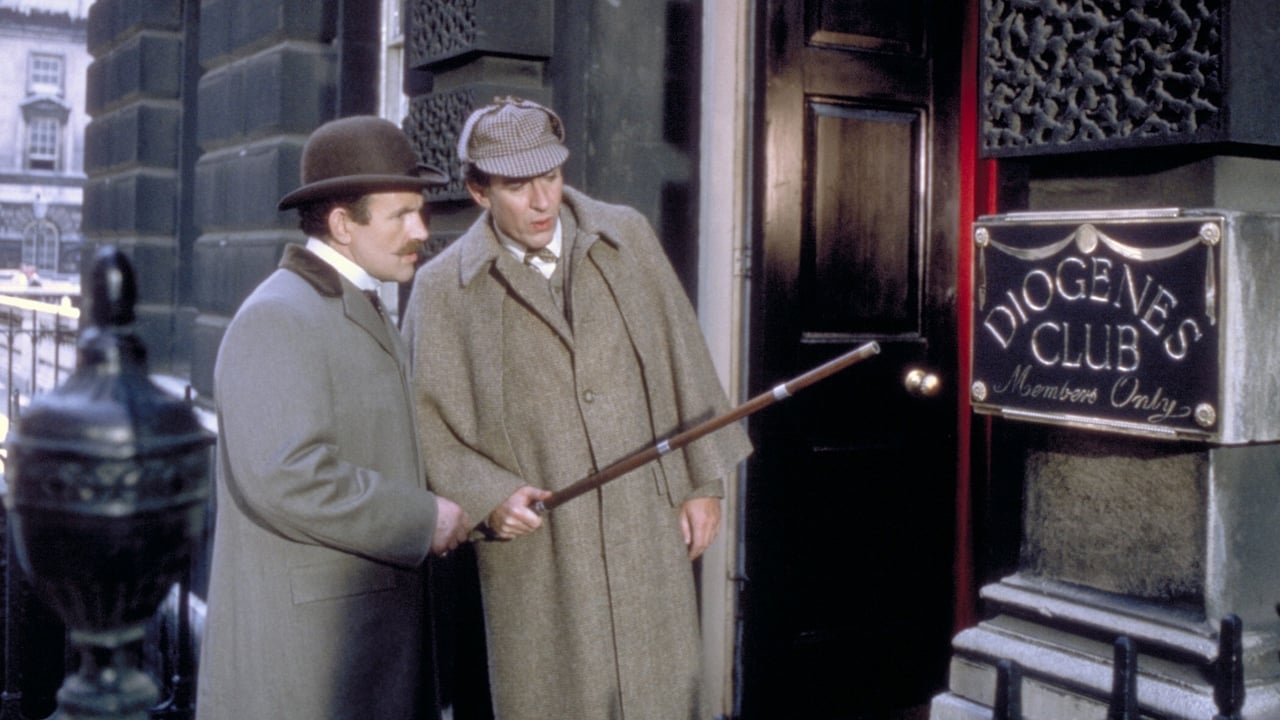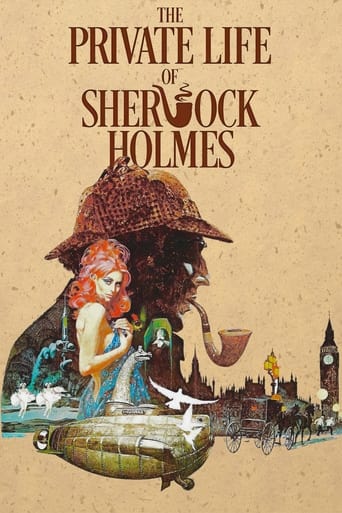

There is just so much movie here. For some it may be too much. But in the same secretly sarcastic way most telemarketers say the phrase, the title of this one is particularly apt.
... View MoreYour blood may run cold, but you now find yourself pinioned to the story.
... View MoreStrong acting helps the film overcome an uncertain premise and create characters that hold our attention absolutely.
... View MoreA clunky actioner with a handful of cool moments.
... View MoreAm a huge fan of Sherlock Holmes and get a lot of enjoyment out of Arthur Conan Doyle's stories. Also love Basil Rathbone's and especially Jeremy Brett's interpretations to death. So would naturally see any Sherlock Holmes adaptation that comes my way, regardless of its reception.Furthermore, interest in seeing early films based on Conan Doyle's Sherlock Holmes stories and wanting to see as many adaptations of any Sherlock Holmes stories as possible sparked my interest in seeing 'The Private Life of Sherlock Holmes'. Also had the thought that a film directed by the legendary Billy Wilder (responsible for a fair share of masterpieces and even his lesser output is worth watching) and starring Robert Stephens and Christopher Lee has got to be at least worthwhile.Worthwhile 'The Private Life of Sherlock Holmes' certainly is. Regardless of whether it bombed or that Wilder was not happy at the significant truncation imposed by studio interference. By all means, 'The Private Life of Sherlock Holmes' would have been an even better film if it were released and available as Wilder intended, but it more than makes do. It may not quite be as good as the best Jeremy Brett adaptations or the best of Basil Rathbone's films, but of the numerous Sherlock Holmes adaptations seen recently it is by far the best.'The Private Life of Sherlock Holmes' does drag at times, particularly towards the end. It also gets a little strange and the ending itself could have had more clarity and punch. On the other hand, Robert Stephens, while no Brett or Rathbone, makes for a great Holmes, very charismatic, intelligent, melancholic and more interestingly fey than most Holmes interpretations. Colin Blakely is both befuddled and loyal as Watson without being a buffoon. The two work very well together with some great lines, including a delightful moment where Holmes denies ever saying his most famous line. Christopher Lee's Mycroft is debonair and commanding. Genevieve Page brings subtle class to her acting, though all the cast do well with some knowing short appearances from Stanley Holloway and Frank Thornton etc. Wilder directs beautifully, bringing his distinctive comedy touch to some scenes while giving the mystery a fun and seriousness and the personal life aspects a melancholic edge. A witty and intelligent script and a vast-majority-of-the-time a highly compelling and entertaining story, that is intriguingly personal and heartfelt in places, and keeping-one-on-their-toes mystery are further advantages, and the film is more arresting than it is dull. Miklos Rozsa's music score sears with emotion and atmosphere, like a character of its own. 'The Private Life of Sherlock Holmes' looks fantastic, for me it's one of the best-looking films featuring the iconic detective. It is beautifully shot and the costumes are appealingly evocative but the star in this regard is the sets, have never seen a better looking Baker Street on film. Overall, very good. 8/10 Bethany Cox
... View MoreSir Arthur Conan Doyle's iconic detective has always been astute at cheating death (you'd practically imagine him, upon leaving the room, to call out "Be Reichenbach!"). But how to cheat a movie death, outliving the chipper Basil Rathbone adventure serials of the 40s and more sombre Christopher Lee Hammer Horror films of the 50s/60s? Why, by the 1970s version of one of Hollywood's favourite contemporary go- to tropes: the gritty reboot. Behold: The Private Life of Sherlock Holmes. Penned by Billy Wilder and I.A.L. Diamond, arguably Classical Hollywood's most famous comic duo after the Screwball era, Private Life is an enjoyable romp, but a touch too confused in terms of what it wants to be to really hit home. Take the 'gritty reboot' qualifier, for one. Wilder seems to be simultaneously striving for an old- fashioned feel (the scratchier, grainier film stock, stagier performances, and more bombastic score), while also embracing the freedom the 1970s have lent him (Holmes can do cocaine here! Nudity! References to homosexuality, and even Holmes' sexuality!), which he does with almost whimsical abandon. This disjuncture can't help but feel a touch gratuitous, like a teen giddily but clumsily experimenting out of parental supervision. Moreover, its ensuing projected uncertainty worms its way into the rest of the film. As the first third, a cute but overstated prologue set strictly to reflexively tweak and challenge the public's - and audiences' - perceptions of Holmes' legendary mystique winds up, we settle into a British Isles-spanning mystery adventure, which chugs along satisfactorily. The seemingly disparate elements of the plot's mystery inevitably coalesce with a suitable 'big reveal' and intriguing conspiratorial undercurrent. Still, affairs culminate somewhat awkwardly, especially anchored on an unsatisfyingly understated climax - which, spoilers aside, has no business falling so flat, considering it involves international intrigue, explosives, and the Loch Ness Monster(!!). It's also an oddly flat and disinterestedly serious film, considering Wilder and Diamond's satirical pedigree, and the fact that Robert Stephens appears to be bursting to uncork the campy Holmes he seems to be barely keeping in check. A sillier, zanier Billy Wilder touch could have helped liven up the proceedings and sweep plot quibbles under the rug, but profiling the most fiercely observant character in literary history makes such audience scrutiny and nitpicking impossible to avoid. Ultimately, though, the majority of the film's plot gaps lead to a mishandled characterization of Holmes himself. Taking its cue from the film's reflexive deflating of the legend, Holmes is played as more emotional and far less intuitive and observant than customary, and even prone to the kind of asinine redundant questions he would normally rebuke others for. This uneven portrayal leads to several inconclusive plot points and character beats at the film's conclusion, leaving a conclusion intended as poignantly bittersweet playing as simply vexing instead. Still, the Scotland sequences are fun, if a bit twee - every single castle Holmes and Watson travel to is accompanied by a blare of bagpipes, and the barely feigned accents are something else - while the 'Loch Ness by night' interludes are a welcome dose of The Hound of the Baskervilles- calibre crackling tension. Even if the 'Sherlock Holmes vs. Loch Ness Monster' plot sounds like a Scooby-Doo episode, Wilder and Diamond handle it adeptly enough to keep the fun and stave off the folly. Robert Stephens' work as Holmes is capably amusing and eloquent, but more fey and extravagantly emotional than one would hope for. Colin Blakely is similarly hammy but more gruffly entertaining Dr. Watson, taking notes from Nigel Bruce, but thankfully nowhere near as bumbling and incompetent (the man is a military doctor, after all, wot wot). Geneviève Page is a bit too flat to much endear herself as a hysterically determined woman with secrets of her own, but the always superb (and former Holmes himself!) Christopher Lee is excellently clipped and debonair as Holmes' enigmatic brother Mycroft. The regular players of the Holmes pantheon are iconically watchable enough that the characters themselves outperform the actors or story that ensconce them: pleasant but vaguely irksome, and overall mediocre. As such, The Private Life of Sherlock Holmes is neither the witty, revisionist take you'd expect from Billy Wilder, or much of a gritty postmodern exposé. What it is is a perfectly passable trifle. And are trifles overall worth it? Elementary. -6.5/10
... View MoreAdvocates for this film say the reason it stinks is that Wilder wasn't able to make it according to his original vision. I'm not sure I buy this. I've seen the magic that can result from restoring a film that's been mutilated by stupid reediting, "The Wicker Man" being a prime example. But Wilder himself is responsible for the current version of "Private Life" we have now, and what there is of it is so terrible it's just hard for me to imagine that he could have made a masterpiece out of it by doubling its length.The main problem to me with "Private Life" is that it feels like what it was, a big stodgy overproduced road show movie in the tradition of "Gone With The Wind" and "It's A Mad, Mad, Mad, Mad World." It was, in the lingo of the time, square. 1970 was a year when much more adventurous films like "Joe" and "M*A*S*H" and "Gimme Shelter" and "Little Big Man" were on offer to the sophisticated film-goer, and thought they have their own flaws their relative sophistication and freshness made the likes of "Private Life" look pretty stale and tawdry in comparison. Its squareness still makes me cringe, but this may be why younger viewers like Mark Gatiss and Steven Moffat, the creators of "Sherlock," don't have the same problem; they're too young to know what square is.Sherlock Holmes should be a role that's second nature to any reasonably skilled and intelligent British actor, and it's astounding to watch Robert Stephens of all people failing where so many very different talents, from Basil Rathbone and Peter Cushing to Benedict Cumberbatch and Ian Richardson, each found his own ingenious way into this iconic character. I put the blame for this solely on Wilder, as reportedly he treated Stephens so badly during the shoot that the actor suffered a breakdown, thus spawning the urban legend that playing Holmes drives people crazy, which in turn latched itself on to Jeremy Brett. News flash: it's unfortunately true that Brett had issues with the role of Holmes, but in general you cannot get bipolar disorder from acting.
... View MoreI am not entirely comfortable giving this movie just three stars, because I cannot say that I did not like it. But I also cannot say I did like it or even that it was okay, so I am stuck in the middle. I have chosen three stars because what I do not like about it I dislike much more than I like what I do like.First of all, I should say that although I like Sherlock Holmes well enough, I never was a big fan. I much prefer other fictional detectives. So the fact that this movie takes great liberties with him, the stories about him, and the other characters in those stories matters to me not at all. My comments relate to the movie as a movie, not to its faithfulness to Doyle's stories.The problem is that I am gay. If I were straight, I might be in hog heaven watching this movie, with all the squirmy, slimy gay jokes and innuendos, the female nudity and leering thereat, etc. But I AM gay, and I love being gay and am genuinely proud and delighted to be gay, so portraying what I am as something undesirable and shameful does not entertain me.Robert Stephens is marvelous, as he always was, particularly when he was young; Christopher Lee is a charmer at any age; and Colin Blakely is fine as Watson. I am thinking my problem is Billy Wilder. I have not seen Some Like It Hot in a very long time, but I suspect the comical cross-dressing and the potential horrors implicit in it would bother me now too.Evidently Wilder was none too fond of homosexuality and other alternate ways of being except as opportunities to leer and squirm and make wisecracks. Too bad. Not for him - he's dead - but for me. I used to like him, but no more.I can forgive Some Like It Hot because Marilyn is in it, and she is without question the loveliest human being who ever stood before a camera; but she is not in this movie, so down it goes.
... View More